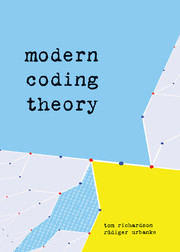Book contents
- Frontmatter
- Contents
- PREFACE
- 1 INTRODUCTION
- 2 FACTOR GRAPHS
- 3 BINARY ERASURE CHANNEL
- 4 BINARY MEMORYLESS SYMMETRIC CHANNELS
- 5 GENERAL CHANNELS
- 6 TURBO CODES
- 7 GENERAL ENSEMBLES
- 8 EXPANDER CODES AND FLIPPING ALGORITHM
- A ENCODING LOW-DENSITY PARITY-CHECK CODES
- B EFFICIENT IMPLEMENTATION OF DENSITY EVOLUTION
- C CONCENTRATION INEQUALITIES
- D FORMAL POWER SUMS
- E CONVEXITY, DEGRADATION, AND STABILITY
- Authors
- Index
PREFACE
Published online by Cambridge University Press: 05 September 2012
- Frontmatter
- Contents
- PREFACE
- 1 INTRODUCTION
- 2 FACTOR GRAPHS
- 3 BINARY ERASURE CHANNEL
- 4 BINARY MEMORYLESS SYMMETRIC CHANNELS
- 5 GENERAL CHANNELS
- 6 TURBO CODES
- 7 GENERAL ENSEMBLES
- 8 EXPANDER CODES AND FLIPPING ALGORITHM
- A ENCODING LOW-DENSITY PARITY-CHECK CODES
- B EFFICIENT IMPLEMENTATION OF DENSITY EVOLUTION
- C CONCENTRATION INEQUALITIES
- D FORMAL POWER SUMS
- E CONVEXITY, DEGRADATION, AND STABILITY
- Authors
- Index
Summary
This book is all about iterative channel decoding. Two other names which are often used to identify the same area are probabilistic coding and codes on graphs. Iterative decoding was originally conceived by Gallager in his remarkable Ph.D. thesis of 1960. Gallager's work was, evidently, far ahead of its time. Limitations in computational resources in the 1960s were such that the power of his approach could not be fully demonstrated, let alone developed. Consequently, iterative decoding attracted only passing interest and slipped into a long dormancy. It was rediscovered by Berrou, Glavieux, and Thitimajshima in 1993 in the form of turbo codes, and then independently in the mid 1990s by MacKay and Neal, Sipser and Spielman, as well as Luby, Mitzenmacher, Shokrollahi, Spielman, and Stemann in a form much closer to Gallager's original construction. Iterative techniques have subsequently had a strong impact on coding theory and practice and, more generally, on the whole of communications.
The title Modern Coding Theory is clearly a hyperbole. There have been several other important recent developments in coding theory. To mention one prominent example: Sudan's algorithm and the Guruswami-Sudan improvement for list decoding of Reed-Solomon codes and their extension to soft-decision decoding have sparked new life into this otherwise mature subject. So what is our excuse? Iterative methods and their theory are strongly tied to advances in current computing technology and they are therefore inherently modern. They have also brought about a break with the past.
- Type
- Chapter
- Information
- Modern Coding Theory , pp. xiii - xviPublisher: Cambridge University PressPrint publication year: 2008

